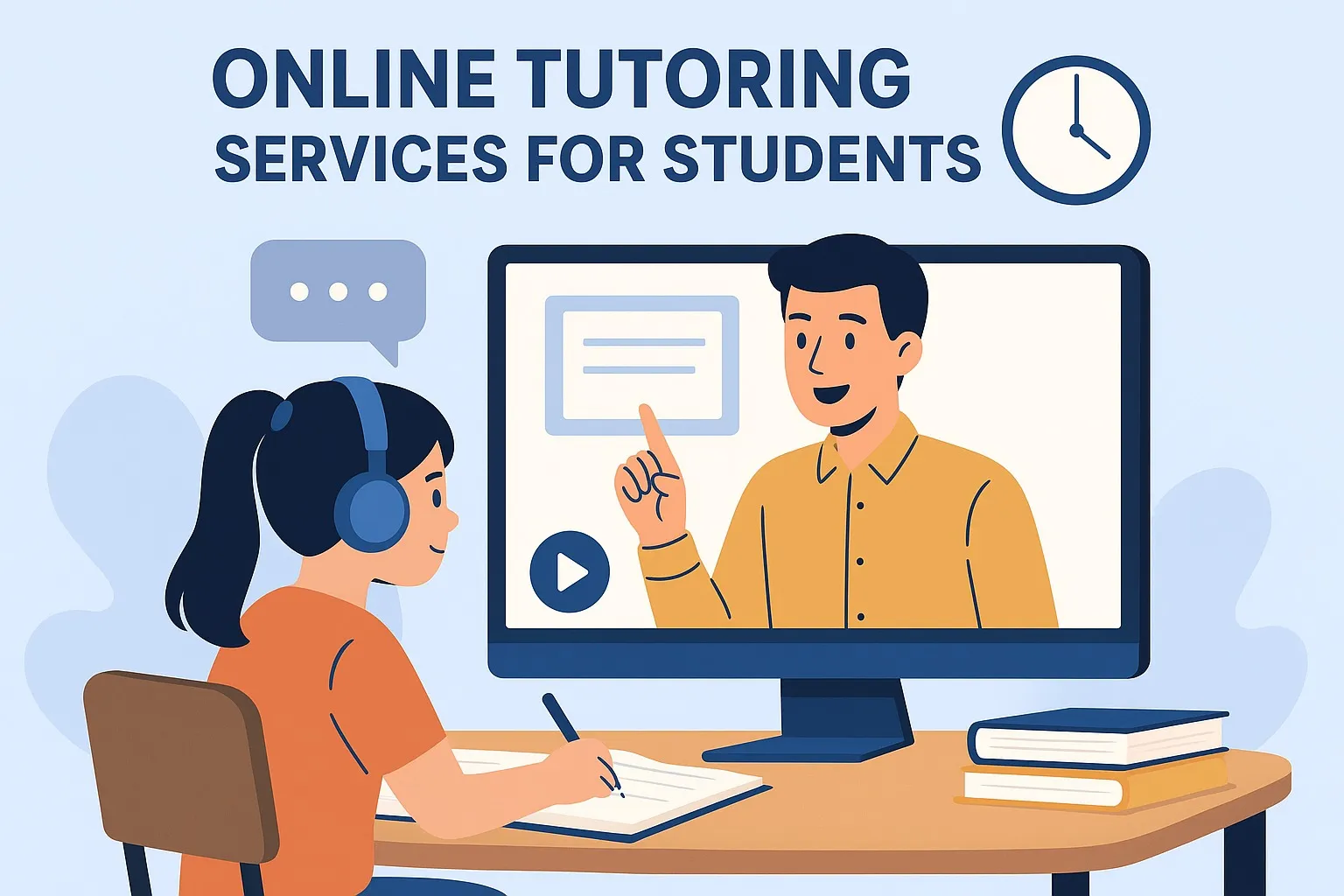Online Tutoring Services for Students: A Comprehensive Guide to Modern Learning
In today’s fast-paced digital era, education is no longer confined to classrooms and textbooks. The emergence of online tutoring services for students has revolutionized the way learners access knowledge, practice skills, and prepare for academic success. With growing access to the internet, digital platforms, and interactive tools, students of all ages are finding new ways to receive personalized guidance from professional tutors.

This article explores everything you need to know about online tutoring services for students - from their history and benefits to challenges, trends, and the future of this booming industry. Whether you are a parent looking for support, a student seeking guidance, or an educator interested in teaching online, this guide will help you understand how online tutoring is shaping education in the 21st century.
The Evolution of Online Tutoring Services
The concept of tutoring is centuries old, dating back to scholars and private teachers guiding small groups of students. However, the transformation from in-person coaching to online tutoring services for students began in the late 1990s with the rise of the internet. Initially, online education was limited to text-based communication and email support, but it quickly grew into interactive platforms with live video sessions, chat functions, and collaborative whiteboards.
Today, advanced technologies like artificial intelligence, adaptive learning software, and real-time assessments make online tutoring services for students not only accessible but also highly effective. The evolution highlights how digital transformation has bridged geographical gaps and democratized education.
Key Milestones
- 1990s: Introduction of e-learning portals
- 2000s: Growth of video conferencing tools
- 2010s: Massive Open Online Courses (MOOCs) and global tutoring platforms
- 2020s: AI-powered learning, gamification, and hybrid tutoring
Why Students Need Online Tutoring Services
The growing demand for online tutoring services for students is fueled by several factors. Traditional classroom teaching often cannot address individual learning needs due to limited time and large class sizes. Online tutoring bridges this gap by offering personalized, flexible, and convenient solutions tailored to each student’s strengths and weaknesses.
For students struggling in specific subjects, online tutoring offers targeted support. For high achievers, it provides opportunities to explore advanced concepts. Moreover, it empowers learners to build confidence, improve study habits, and stay motivated throughout their academic journey.
Common Reasons Students Turn to Online Tutoring
- Difficulty keeping up in class
- Preparation for competitive exams
- Desire to improve grades
- Flexible learning schedules
- Access to expert tutors not available locally
Advantages of Online Tutoring Services
One of the biggest reasons behind the surge in popularity of online tutoring services for students is the wide array of benefits they bring. Unlike traditional tutoring, online platforms provide unmatched flexibility, accessibility, and interactive experiences.
Students can study from the comfort of their homes, save travel time, and choose tutors from around the world. Parents appreciate being able to monitor progress and see measurable improvements. Most importantly, online tutoring adapts to each learner’s pace and style.
Key Benefits
- Flexibility: Learn anytime, anywhere
- Personalization: Lessons tailored to individual needs
- Cost-effectiveness: Competitive pricing compared to in-person tutors
- Global reach: Access to international subject experts
- Interactive learning: Use of whiteboards, quizzes, and simulations
Example
A high school student in Vietnam preparing for SAT can learn directly from a math tutor in the United States without leaving their home.
Challenges of Online Tutoring Services
Despite the many benefits, online tutoring services for students face challenges that need addressing. Technology barriers, such as poor internet connections, can disrupt sessions. Some students may struggle with motivation or distractions when studying online.
Additionally, the lack of face-to-face interaction may reduce emotional connection between tutor and student. Security and trust also become concerns, as parents must ensure that platforms maintain safety and privacy for their children.
Main Challenges
- Dependence on technology
- Lack of in-person engagement
- Time zone differences between tutors and students
- Quality assurance across platforms
- Security and privacy risks
Popular Subjects in Online Tutoring
Students turn to online tutoring services for students across a wide range of subjects. While mathematics, science, and English dominate demand, subjects like coding, music, and even art are also increasingly popular.
Many platforms now specialize in exam preparation for standardized tests such as SAT, ACT, IELTS, and GRE. The diversity of subjects ensures that every learner can find support tailored to their goals and aspirations.
High-Demand Subjects
- Mathematics (algebra, calculus, statistics)
- Science (physics, chemistry, biology)
- English (grammar, literature, essay writing)
- Coding and computer science
- Foreign languages (Spanish, French, Chinese)
Choosing the Right Online Tutoring Platform
With hundreds of platforms available, selecting the best online tutoring services for students can be overwhelming. Parents and students must evaluate several factors before committing to a program.
Reputation, tutor qualifications, pricing, and learning tools are critical elements to consider. Trial sessions can also help determine whether the tutor’s teaching style matches the student’s learning preferences.
Checklist for Selecting a Platform
- Verify tutor credentials
- Read reviews and testimonials
- Compare pricing plans
- Test interactive features
- Evaluate customer support
Pro Tip
Start with a free trial class before purchasing long-term packages.
The Role of Parents in Online Tutoring
Parents play a vital role in ensuring the effectiveness of online tutoring services for students. From selecting the right platform to monitoring progress, parental involvement is key to maximizing learning outcomes.
Parents should create a distraction-free environment, encourage consistent study schedules, and communicate regularly with tutors. Their active engagement ensures that students remain motivated and accountable for their learning journey.
Parental Responsibilities
- Ensure reliable internet and devices
- Set realistic goals with tutors
- Monitor progress reports
- Encourage positive study habits
- Provide emotional support
Technology and Innovation in Online Tutoring
Technology is the backbone of modern online tutoring services for students. Platforms now integrate AI, machine learning, and gamification to make learning more engaging. Virtual reality (VR) and augmented reality (AR) are emerging as powerful tools to simulate real-life experiments and scenarios.
Data analytics also helps track student performance, providing insights for personalized learning paths. These innovations are making online tutoring not only effective but also exciting for students.
Examples of Innovation
- AI-based progress tracking
- Gamified quizzes and competitions
- VR-enabled science experiments
- Adaptive learning algorithms
Global Trends in Online Tutoring
The demand for online tutoring services for students is not limited to one region - it’s a global phenomenon. Countries like China, India, and the United States lead the industry, with millions of students relying on online platforms for supplemental education.
In many developing countries, online tutoring has become a solution for limited access to quality teachers. Meanwhile, Western nations are seeing a surge in demand for specialized courses like coding and test preparation.
Trends to Watch
- Growth of mobile learning apps
- Expansion into rural and underserved areas
- Increased use of AI tutors
- Hybrid learning models combining online and offline methods
The Future of Online Tutoring Services
The future of online tutoring services for students looks bright, with continued advancements in technology and growing acceptance of digital learning. As more schools adopt hybrid models, online tutoring will complement classroom education rather than replace it.
Personalized learning powered by AI, immersive experiences through VR, and increased accessibility will define the next era of online tutoring. The industry is projected to grow exponentially, benefiting students, parents, and educators worldwide.
Predictions
- More affordable subscription models
- AI tutors available 24/7
- Expansion into lifelong learning for adults
- Increased collaboration between schools and tutoring platforms
Conclusion
In conclusion, online tutoring services for students have transformed the educational landscape by offering flexible, personalized, and accessible learning opportunities. While challenges like technology dependence and quality control remain, the advantages far outweigh the drawbacks.
Parents, students, and educators must embrace this shift and adapt to the evolving digital world. With innovation and global adoption, online tutoring is not just a temporary trend - it is the future of education, empowering students everywhere to achieve academic excellence and beyond.











